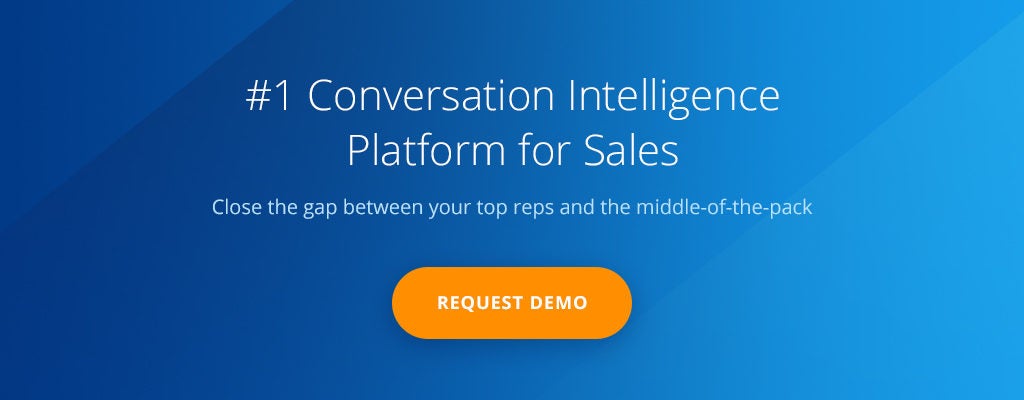Enhancing sales skills with AI: How the technology empowers sales reps
When we think of artificial intelligence (AI), it’s a very cool concept.
Both Siri and Alexa live alongside us, performing Google searches and turning on our lights via voice, just like a human assistant would.
Teslas are driving and parking themselves, and all this innovation raises eyebrows while making life easier.
But if AI is removing the human element from life, won’t it eventually replace me and my sales job?
The business world is looking for outlets to leverage AI for sales in order to add a new element of “intelligence” to their arsenal to make more effective business decisions.
Gong.io uses AI to deliver data to sales professionals that helps them have more effective sales conversations.
By recording and analyzing the sales conversations across my sales process, it surfaces insights like my talk-to-listen ratio, when and how my competitors are mentioned on calls, details into my playbook, and much, much more.
So while I totally understand, and reluctantly accept, that AI may swoop some jobs up in the coming years – I do not see it replacing the role of a B2B account executive. In fact, it’s proven to augment my approach, making me more effective and savvy towards my craft.
Here are three ways AI has made me more effective on my demos:
Improved talk-to-listen ratio.
There’s a common misconception among sellers that the more they talk, the more value they are delivering.
In reality, it’s the opposite. If I can listen during majority of the call, then I can detect my prospect’s needs, plus get to the true source of their business pain and quantify it.
This is a key attribute that separates the true sales pros from the rest.
In practice, it’s easy to latch onto a single pain point the prospect mentions, immediately jumping to a feature and dumping “value.”
But true value needs to be mutual, and that’s only done once your prospect confirms that what you’re showing them aligns perfectly with what they’re attempting to solve. Otherwise, it’s just product.
Few moments have been more interesting in my career than getting smacked in the face with data touting my 72% talk time.
This is not to discredit me as a seller, just a crisp wake-up call that there’s room for improvement.
Even more-so, using AI in sales pointed me to a very specific area prime for improvement. So with this data, I made a conscious effort to listen more, and the best way to do that is…
Asking better questions.
Since Gong captures the list of questions asked on calls, I decided to look at my Closed Won and Closed Lost opportunities to review my question-asking behavior.
I found that the number of questions isn’t the differentiator. In fact, it’s the appearance of open-ended questions that makes the difference.
Opportunities with more open-ended questions converted at a higher rate.
Tracking the use of these questions – typically starting with “Tell me how…” or “What’s the impact of…” lead to my audience telling me their story in-depth.
Knowing the problem, the source, and the consequences arms me to make my demo unforgettable.
I’m not “showing you how,” I’m telling a story, your story with my solution.
By mastering open-ended questions while spreading out questions asked across my demo, I’m ensuring an engaging conversation for the full 45 minutes, leaving an impact on my audience.
Pairing a listen-first approach with open-ended questions is how…
Fine-tuning my playbook.
Gong comes in big time here, automating the above, plus showing me exactly what I discuss on demos.
By analyzing the context of my discussions, it breaks down when I’m talking about features versus value, small talk or business overview, and pricing and nexts steps.
With data depicting what I talk about, for how long, and even where in the conversation – I can see my playbook.
Using Gong and Salesforce data, I saw that Artificial intelligence is the most common topic I discuss on demos. And it’s usually at the 12-minute mark of my demo.
Makes sense, it’s what we do.
But it’s a feature. Value selling isn’t feature selling, so I knew that my conversations were lead by how we do it instead of what we solve.
Good to know, and now I can refine my talk track to focus more on business outcomes and storytelling.
The product demo is a pivotal part of every SaaS sales process. Not because show-and-tell is crucial, but because it’s where value is established and validated.
Within the first 90 days of using AI as a sales rep, I was able to refine my approach with a data-driven strategy.
The human element will forever be the art of B2B sales, but adding AI will impact your abilities.

